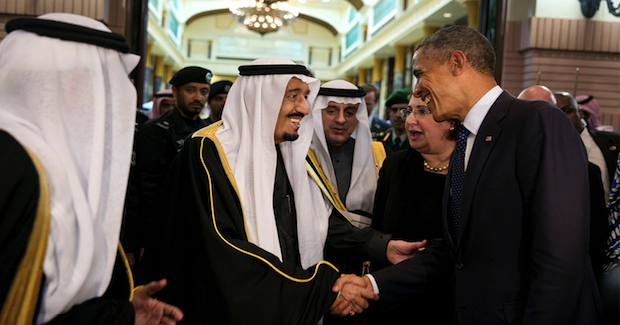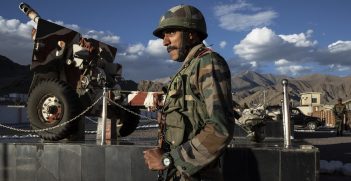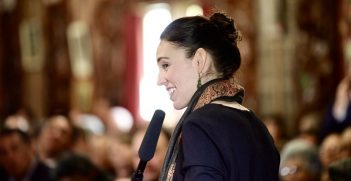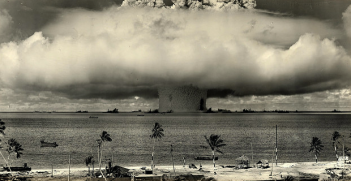Shifting Sands in Saudi Arabia

In an awful demonstration of politically motivated hypocrisy, Saudi Arabia was elected to the United Nations Human Rights Council on 28 October. The election appears almost like a reward for that government’s appalling violations of human rights: in its own country, in Bahrain and especially in its assault on Yemen, which began a year ago. In addition, Saudi Arabia has been a significant supporter of some of the more heinous of the violent groups fighting in Syria.
While Saudi Arabia’s behaviour has always had an unsavoury element to it, this level of violent action in its region marks a departure from what has traditionally been a conservative and cautious approach to domestic and foreign policy. It has historically used its great oil wealth and the comfort of the United States’ security guarantee to try to influence its region and to spread Wahhabism, its malign interpretation of Islam, beyond its borders and as far as Mali and Indonesia.
This change in Saudi behaviour can be attributed to a number of factors that have significantly disrupted the Saudis’ strategic environment. The first of these is domestic. The reasonably well-managed Saudi leadership structure, based on the descendants of the country’s founder, Abd Al-Aziz Ibn Saud, is starting to unravel as his sons and grandsons age and depart the scene. Competition for positions of power among the next generation, conducted largely behind the tent-flap, is intense and potentially destabilising.
The problem has been aggravated by the country’s declining economic fortunes. While still growing, the economy, which relies heavily on oil revenues, has been failing to meet growth and budgetary requirements. It has been a long-standing means of the regime to secure the acquiescence, if not the loyalty of the population, to offer handouts and other benefits. For example, since the Arab revolts of 2011, the government has been dispersing financial handouts to suppress domestic unrest. In 2013, the government awarded benefits to Saudi citizens worth US$127 billion (A$165 billion).
The government in Riyadh is also heavily committed to satisfying the ambitions of the vast Saudi royal family. Estimates vary but it is thought that there could be between 15,000 and 25,000 male members of the royal family in Saudi Arabia (female members are “protected” from public view but it can be assumed that their numbers are comparable). As long as the economy was strong, royal family members could assume that, even if they could not achieve political power, they could enjoy great wealth. Such a prospect is no longer certain.
Moreover, the death of King Abdallah in January 2015 saw the succession of his half-brother, Salman bin Abd Al-Aziz. Salman, who is over 80, is in poor health and has subsequently given his 31-year-old son, Mohammed, considerable power in government and the economy. Rumours of hostility to Mohammed’s dramatic attempts at reform are widespread.
Prince Mohammed’s reform (Vision 2030) is intended to wean Saudis off absolute reliance on the oil industry. He has announced plans to cut bureaucratic red tape, to encourage foreign investment and to sell part of Aramco, the national oil producer.
A second factor reflects a range of foreign policy developments, which have challenged the regime’s vision of its place in the region. Limits to the power of Saudi petro-dollars have been exposed by the failure of the Lebanese, Syrians, Iraqis and even the mendicant Egyptian regime to bow to Saudi policy demands. Moreover, the Saudis have overplayed their hand in their attempts to destroy the US fracking industry and prevent the recovery of the Iranian economy by allowing the price of oil to plummet. While they enjoyed some success, it was limited. The US fracking industry is now picking up and Iran is producing more crude oil than in the past five years – all at the Saudis’ expense.
Perhaps the greatest challenge to the Saudi view of the world and to domestic stability has emerged from a combination of the invasion of Iraq in 2003, including subsequent mishandling of the occupation, and the deal reached by Iran over its nuclear capabilities with the five permanent members of the UN Security Council plus Germany and the European Union. The Iraq invasion removed what the Saudis saw as the Arab bulwark against Iran and the nuclear deal released Iran from the economic and political confines that had been set up by various US administrations.
We are seeing the dénouement of US adventurism in the struggle with Islamic State and the carnage in Syria. While the Iran nuclear deal is still a vulnerable flower, challenged by the hostility of the US presidential candidates and the uncertainties surrounding the Iranian presidential elections next year, it is exerting a huge impact on the region.
In particular, both events served to empower Iran and to enable it to resume its traditional role as the dominant power in the region. This development has exposed Saudi Arabia to a challenge that it is ill-prepared to meet. It sees itself as the power that must resist what it regards as the threat from expansionist Iran but, despite massively outspending Iran on weapons of war, Saudi Arabia lacks the capacity to challenge Iran directly in the region.
It is in this context that the Saudis’ oppression of the Shia population, their support for extremist groups in Syria and their aggression against the people of Yemen must be seen. In these cases, the Saudis have attempted to portray their opponents as pawns of Iran and therefore as proxies in their confrontation with Iran.
The challenges confronting the Saudi regime and its response underline the shallowness of the regime’s domestic and international legitimacy, which depends largely on its capacity to bribe the various forces in the region. A freer Iran, increasingly engaged Turkey and Russia and less direct US engagement in the region’s trouble spots means that approach no longer works. Their environment is increasingly threatening and unpredictable and the old ways no longer work. A new course is not yet apparent.
Dr Anthony Billingsley is a senior lecturer in international relations at UNSW Australia.
This article is published under a Creative Commons Licence and may be republished with attribution.





